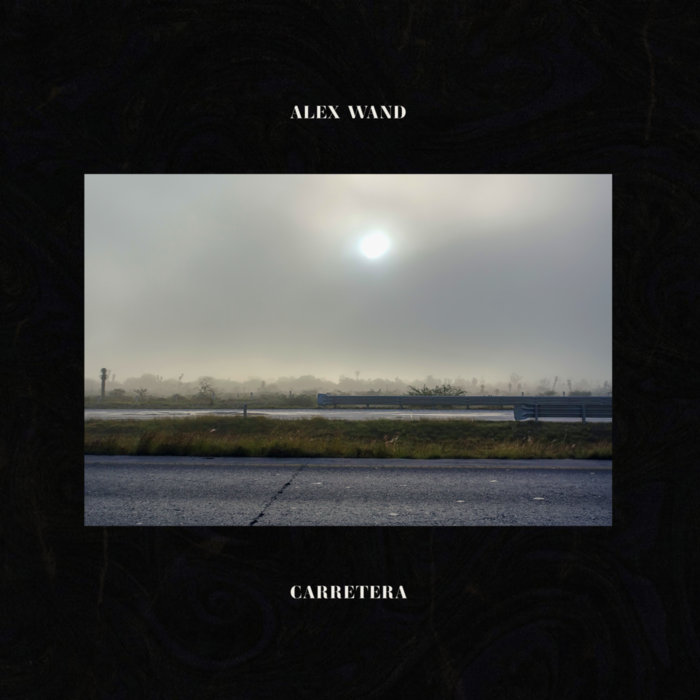Review: Alex Wand – Carretera

Alex Wand
Carretera
In the fall of 2018 composer Alex Wand assumed his Alejandro Botijo persona and began a cycling trip from Los Angeles to Michoacán, Mexico. Alex explains: “I create aliases for myself that highlight certain qualities of my person. I think of them like archetypal, mythological people that help me realize existing aspects of myself. For example, Alejandro Botijo helped me bypass the physical limitations of my body, feelings of loneliness, fear of being hit by a truck, along with many other vulnerabilities that come with cycling over 2,000 miles alone.”
The bicycle trip took him along the migratory path of the monarch butterflies and Alejandro recorded his impressions with field recordings and music from that perspective. The monarch butterfly is the only species of butterfly known to make a two-way migration during the year. Towards the end of October they make their way south, spending the winter in Southern California and Mexico, heading north again in March to spend the summer in the US and Canada. At the conclusion of the trip, Wand/Botijo created a summary of his experiences and the result is Carretera, a series of miniature musical impressions of the journey south.
From the liner notes: “These compositions investigate migration from the monarch’s perspective. The field recordings and spoken word are meant to be ways of listening-with the monarchs by capturing moments of stillness and space on their journey, as well as outlining myriad challenges such as predators, pesticides, and habitat degradation. Alejandro loops, time warps, and pitch shifts the musical sounds to express overlaying temporalities and to articulate the repetitive aspects of migration. With these elements, the music seeks to trace the experience of the monarch/cyclist on their journey to the oyamel forests of Michoacán.”
High Desert, the first track, describes Botijo’s first stage of his trip south from Los Angeles. Single bell-like tones are heard accompanied by a sputtered rushing sound, as if cycling alongside a busy desert highway. Wand provides spoken commentary with his calmly enigmatic voice, repeating a list of the hazardous contents of the roadside along with the beauty of the landscape. There is a swirling mix of headlights, broken bottles and nails together with vivid red and purple sunsets.
Baptist Church follows, and this has lighter tones combined with a softly hopeful tremolo. The vocals begin with “There’s a Baptist Church at the border town where the railroad used to pass through. There’s an old building where the railroad workers used to spend the night.” A series of stronger tones are heard at irregular intervals, invoking the presence of railroad tracks. As the text is repeated, more details are added so that gradually the feeling becomes one of sanctuary – a place that a migrating butterfly – or cyclist – might find rest for the night.
Depredadores is next, full of aggressive percussive beats and active rhythms. The text is now in Spanish, a list of words and names accompanied by low video game sounds. Only a minute and a half in length, Depredadores nevertheless captures the sense of crossing into Mexico by way of a gritty border town. Texaco follows with the sound of mystical drums and cymbals. The text speaks of an abandoned gas station, a barbed wire fence, farmland and a chili factory. Deep guitar chords paint a grim and desolate picture of what could be an agricultural town in northern Mexico.
Mercado, on track 5, however, is very different. A lovely groove comprised of light electronic tones is heard and soon accompanied by animated street sounds and the chatter of voices in Spanish. Clearly we have traveled farther into Mexico and have finally arrived at a warm and welcoming village. Repartiendo el Pan follows, opening with a sweet repeating guitar phrase and the sound of chirping birds. Children are heard playing, and wind instruments enter with a happy bounce. The piece ends with a short fragment of a pop song sung in Spanish, continuing the hospitable feeling that carries over from the previous track. Clearly we are deep into Mexico.
Stream, track 7, is just that: the sounds of rushing water accompanied by electronic rhythmic phrases. There is no spoken narration or human sounds. Restful, calming and most definitely rural. Carretera follows and this opens with an active, bouncing synth and repeating guitar lines that radiate an upbeat and optimistic feel. A series of spoken place names and Spanish nouns are heard, adding an intimacy to the music and creating an emotional sense of homecoming.
The final track is I Wish I Could Disappear, and this features sunny, repeating guitar lines accompanied by the sung and spoken words of the title. This is a final summing up of the emotional changes triggered by the long journey. From the northern border lands to a place deep in the Mexican interior, there is a real sense of longing in this music for a simple communal life that is in harmony with the natural environment. Perhaps it is this – and not just the climate – that draws the monarch butterflies back each winter.
Carretera is an engaging and succinct depiction of a long emotional journey, as seen from the eye level of a migrating butterfly. Like the monarch, we long for a place where we can be part of a welcoming community – Carretera completely and elegantly captures this sensibility.
Carretera is distributed for digital download via Bandcamp and a vinyl disk may be ordered. There is also a companion film Camino de las Monarcas, that is available for download.